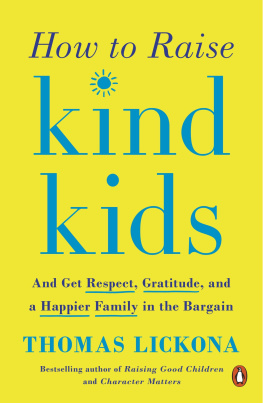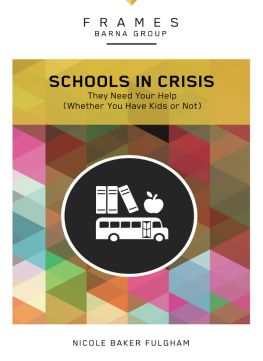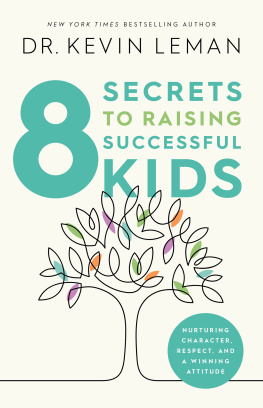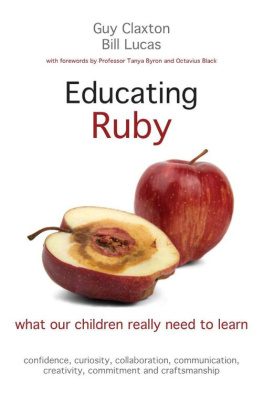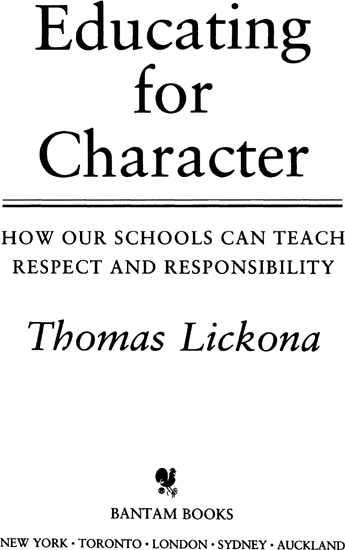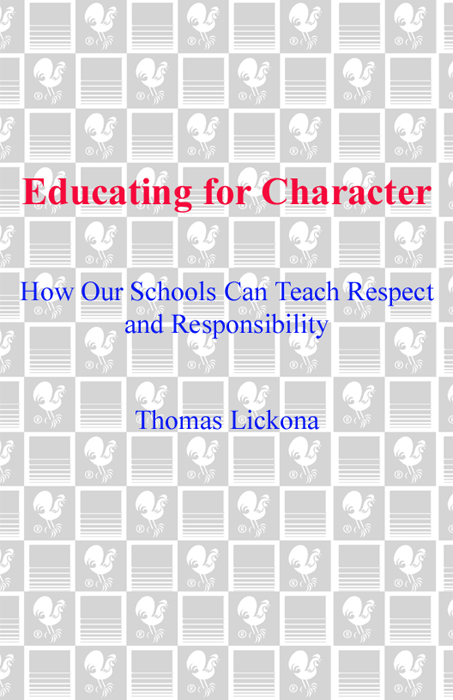
Thomas Lickona has achieved the rare feat of combining good scholarship with helpful, practical applications. All teachers and parents will find this book exceedingly useful.
Sidney Callahan, Ph.D.,
Professor of Psychology, Mercy College, and author of In Good Conscience: Reason and Emotion in Moral Decision Making
Lickonas book provides so many examples and helpful teaching strategies that it is bound to rekindle hope and commitment.
Lisa Kuhmerker, Ph.D.,
Publisher/Editor of Moral Education Forum and author of The Kohlberg Legacy for the Helping Professions
Educating for Character is a work of scholarship and of vision an enormously important resource for educators everywhere.
Dr. Eric Schaps,
President, Developmental Studies Center
A moral society doesnt just happen. It takes work and effort by parents, educators, church leaders, and community agencies. Educating for Character will be a unique resource for all those who try to carry out this awesome responsibility.
Sister Catherine McNamee, C.S.J.,
President, National Catholic Education Association
Professor Lickona shows teachers how to create the kind of responsibility and caring classroom community within which both academic achievement and moral development will flourish.
Drs. Nan and Ted Graves,
Executive Editors, Cooperative Learning Magazine
An extraordinarily important and useful book. It not only makes a compelling case for revitalizing educations role as a developer of character, it provides a solid means of accomplishing the task.
Michael Josephson,
President, The Joseph and Edna Josephson Institute of Ethics
A powerful statement of the need for values education in the nations schools, and a detailed roadmap of how to go about teaching moral values.
The Journal of Moral Education
A LSO BY T HOMAS L ICKONA :
Raising Good Children
for God
Acknowledgments
I would like to express heartfelt thanks:
To all the teachers I have been privileged to learn from during the past 20 yearsteachers in my graduate courses, teachers whose classrooms Ive observed, teachers Ive interviewedwhose practical wisdom and examples of values education fill the pages of this book.
To my wife Judith for being a true partner on this bookfor reading every line of every draft and serving as my first editor; for dozens of suggestions that improved the shape and substance of chapters; for a continuing conversation about the problems children face today and what they need from adults to grow into good people; and for shoring up my faith when discouragement was at the door.
To my father and mother, Edward and Winifred Lickona, and to my father-in-law Tom Barker, for their steadfast love and encouragement; to Sweetheart, who I know helps me still; and to my sons Mark and Matthew, for the love and laughter they bring to my life and for all the times they asked, Hows the book going, Dad?
To Toni Burbank, my editor at Bantam, for many things: her commitment to the subject of the book; her unerring ability to pinpoint where a change was needed in content, length, or handling of material; her suggestion of the books title; and her taking every possible stepfrom guidance in the early stages to selection of the copy editorto enhance the appeal of the book and help it reach its intended audience. I feel blessed to have an editor with her sensitivity, skill, and caring.
To Robin Straus, my agent, for handling with her consummate professionalism all the steps from submitting the book proposal to placing pre-publication excerpts; for her wonderful, uplifting letters along the way; and for patience when progress was slow.
To William D. Drennan and Nancy Scott, Bantams copy editors for the book, for their sensitive suggestions for improving the manuscript; to Charlie Trantino for her conscientious work on the index; and to Linda Gross at Bantam, for her hard work on the many details involved in bringing the book to completion.
To the college where I teach, the State University of New York at Cortland, for supporting my research with a 1985 fall sabbatical that enabled me to visit U.S. and Canadian schools known for their programs in values education.
To Eric Schaps and his Developmental Studies Center for generously subsidizing the travel involved in my sabbatical research; to Marilyn Watson, Jacques Benninga, Ed Wynne, Howard Radest, Mary Ellen Flaherty, and Steve Barrs for helping to arrange school visits and taking me into their homes during my sabbatical travels; and to all the teachers, administrators, parents, and students at the schools I visited for assisting me in learning about their schools efforts to teach good values.
To Suzanne Brisk and Tina Metzcus for helpful materials on sex education, and Ted Graves for suggestions on Chapters 10 and 15.
To all the people who have kept me in their prayers, especially my dear neighbor Elizabeth Dwyer.
In his book The Road Less Traveled, psychiatrist Scott Peck writes about amazing graceall the times in our lives when we feel helped in ways that do not seem attributable to natural causes. For religious believers, such graced moments are experienced as the loving action of a God who holds each of us in His awareness. As a personal example, Peck tells of unexpectedly receiving, from a person who previously had been quite unfriendly to him, the kind offer of a book that provided the ideal resolution of a problem Peck was just then struggling with in his writing. I have often had the same sort of experience as I worked on this book. Instances, for example, when exactly the right piece of information or conversation came my way, without my seeking it, as I began to work on a particular section of the manuscript.
For me, such moments call to mind a statement by St. Thomas Aquinas: All truth comes from the Holy Spirit. For the errors in this book, I take responsibility. For whatever truth it contains, I would like to thank the source.
Tom Lickona
Cortland, New York
April, 1991
Note to the Reader
There is a story that Haim Ginott used to tell about a teacher who was honored by her community as the teacher of the year. The day after receiving this award, on the way home from school, she spied two boys writing in the wet cement in front of her house. As she drew closer, she saw that they were writing uncomplimentary inscriptions about her. So she went up to the boys and beat them up.
The next morning, a shocked school principal summoned the teacher to his office. Mrs. Smith, he said, I hardly know where to begin. You, the teacher of the year, a person to whom we all look as a model, someone who loves children, have just gone and beaten two of them up!
Mrs. Smith looked down, paused, and said, Well, I love them in the abstract but not in the concrete.
Good education is easier to espouse in the abstract than to provide in the concrete. So in writing this book, which I hope will be a practical resource, I have tried to be as concrete as possible.


